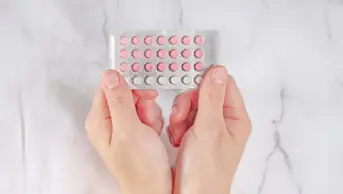
Johan Siebke / Alamy Stock Photo
Women taking non-steroidal anti-inflammatory drugs (NSAIDs) in combination with hormonal contraception are at an increased risk of blood clots, study results have suggested.
Researchers concluded that NSAID use in women taking hormonal contraception was associated with up to 23 additional venous thromboembolic events compared with women not using NSAIDs.
The retrospective cohort study, published in the BMJ on 6 September 2023, reviewed national medical records of 2 million women aged 15–49 years living in Denmark between 1996 and 2017, with no history of blood clots, cancer, hysterectomy or fertility treatment.
Hormonal contraceptive methods used included hormone patches, vaginal rings, contraceptive pills, injections, implants and intrauterine devices. These were categorised as giving a high, medium or low risk of venous thromboembolism (VTE).
The study reported that NSAIDs were used by 529,704 women while using hormonal contraception, with ibuprofen being most frequently used (60%), followed by diclofenac (20%) and naproxen (6%).
Over the first week of treatment, the researchers found that NSAID use was associated with 4 extra venous thromboembolic events per week per 100,000 women not using hormonal contraception, 3 extra venous thromboembolic events in women using low-/no-risk hormonal contraception, 11 extra events in women using medium-risk hormonal contraception, and 23 extra events in women using high-risk hormonal contraception.
Among the NSAIDS, researchers reported that strongest VTE association was observed with diclofenac compared to ibuprofen and naproxen.
The authors of the study concluded that the absolute risk of VTE remains low, even in users of high-risk hormonal contraception and NSAIDs; however, they stressed that women needing hormonal contraception and regular use of NSAIDs should be “advised accordingly” owing to the widespread use of the combination.
Commenting on the study, Janet Barter, president of the Faculty of Sexual and Reproductive Healthcare, stressed that further robust studies are required to establish the safety of the combination use and warned women that any concerns regarding their contraception should be discussed with a GP or at their local sexual health centre.
“This research must be viewed in the context of the well-established benefits of hormonal contraceptive use, such as preventing unplanned pregnancies, reducing the risk of certain cancers, and protecting against acute pelvic inflammatory disease and ectopic pregnancies,” she said.
“There are many different options available to you, both hormonal and non-hormonal and your doctor will be able to help you select the method that is best for you.”
Also commenting on the study, Ian Musgrave, senior lecturer at the Faculty of Medicine, School of Medicine Sciences, University of Adelaide, criticised the reporting of the study as it called for “unwarranted concern”.
“The conclusion was only true for the high-risk group, the medium group risk was the same as the women on no hormonal contraception and, for the low-risk group, the risk may even be less,” he said.


